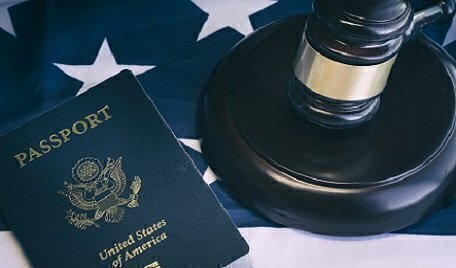In a second significant setback this week for the Trump Administration on its immigration policy, a federal judge in Los Angeles has barred government officials from taking away legal protection of “DACA” immigrants without using a fair procedure. The judge’s ruling Monday night in favor of those covered by the Deferred Action for Childhood Arrivals program came only hours after the Supreme Court had turned aside temporarily an Administration effort to shut down the program as of next month.
 The development in the California chambers of U.S. District Judge Philip S. Gutierrez temporarily barred immigration officials from revoking summarily the permits that younger undocumented immigrants had received to stay in the country and to work and study. Under the order, officials must give each DACA recipient a chance to defend themselves against loss of their permit, to show that they had not violated the terms of DACA protection. The judge said it was not enough to simply tell a recipient that the permit was being revoked immediately, with no recourse.
The development in the California chambers of U.S. District Judge Philip S. Gutierrez temporarily barred immigration officials from revoking summarily the permits that younger undocumented immigrants had received to stay in the country and to work and study. Under the order, officials must give each DACA recipient a chance to defend themselves against loss of their permit, to show that they had not violated the terms of DACA protection. The judge said it was not enough to simply tell a recipient that the permit was being revoked immediately, with no recourse.
Judge Gutierrez’s order covers all DACA recipients who had their permits revoked without a fair procedure, as well as all others who might face loss of their permits in the future as the court case proceeds. In addition, the order is nationwide in scope.
Since last October, one month after the Administration announced plans to end legal protection against deportation of youths under DACA, civil liberties advocates have been pursuing claims that the protection has been ended swiftly for some individuals without advance notice and without any review procedure. Such revocations, the advocates argued, violated the official policy for the DACA program, and violated federal laws guaranteeing fair procedures by government agencies. Judge Gutierrez ruled on Tuesday night that the challengers were likely to win ultimately on the point that the revocations were illegal. (The challengers also had raised a constitutional argument, claiming that it violated the guarantee of due process to summarily take away the DACA permits. Judge Gutierrez did not rule on that claim.)
Under the DACA program, in effect for more than five years, nearly 700,000 younger immigrants who came to this country as children and had no legal right to remain were protected from deportation if they obeyed the terms of DACA, including a provision that they not violate laws against serious crimes or multiple minor offenses.
In the challenges before Judge Gutierrez, the advocates contended that immigration officials were taking away permits to stay and work on the basis of unproven criminal acts, and were sometimes doing so based on the mere fact that they were in the country illegally. Under the DACA program itself, they contended (and the judge agreed), the mere fact of illegal presence in the U.S. was not supposed to be a basis for losing the right to remain and the right to work.
It is unclear just how many individual DACA recipients have lost their protection in the manner they challenged, but the judge found that the number could be significant and that it could grow in the future if not stopped during the time the legal challenge moves forward in court.
Under the terms of the judge’s Tuesday order, it protects all DACA recipients who, after January 19 last year (the day before President Trump took office), have had their DACA authorizations taken away “without notice or an opportunity to respond, even though they have not been convicted” of the kind of crimes that DACA lists as the basis for losing protection.
At a minimum, the procedure must include notice that they are at risk of losing protection, plus “a reasoned explanation” of why, and an opportunity to be heard before revocation.
Mere unlawful presence in the U.S. cannot be used as a reason for withdrawing the protection, the order said.
For those who lost their permits, the government must immediately restore them, the judge declared, and must allow any individual DACA recipient to seek a renewal of their protected status if it was due to expire on March 5 and if they could not seek a renewal earlier because their permits had been revoked.
Because the judge’s order is technically in the form of a “preliminary injunction,” the Administration has the option of pursuing an appeal to the U.S. Court of Appeals for the Ninth Circuit. In such an appeal, the Administration can also challenge the judge’s decision to extend the new protection to all who are included in the class he defined.
Among the individual DACA recipients who joined in the lawsuit, seeking protection for themselves and for others in similar circumstances, were three youths who dispute official claims that they have committed crimes serious enough to cost them their permits to stay and work. In cases where officials claim serious crimes, the youths have argued that they have not been convicted of those offenses.
Meanwhile, discussions continue in Congress over proposals to keep the DACA program in existence, but so far those talks have produced no agreement. Thus, the fate of the DACA recipients will continue to depend upon what happens in the courts.







